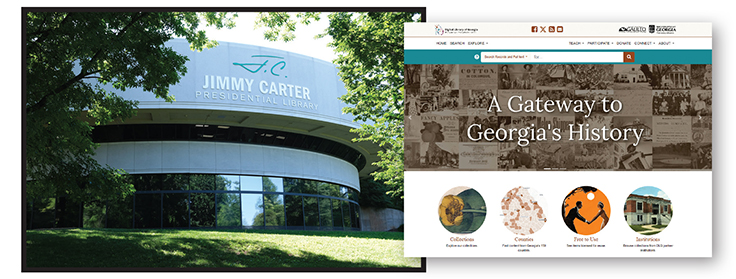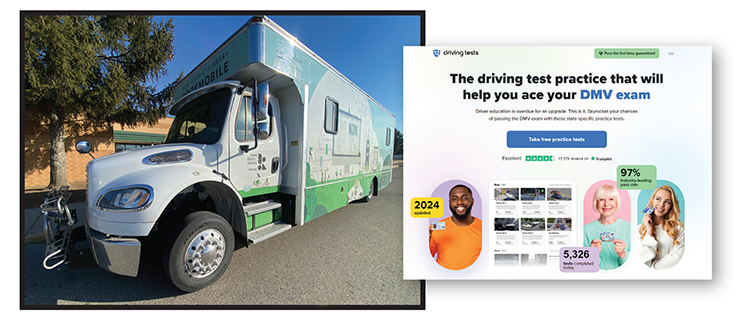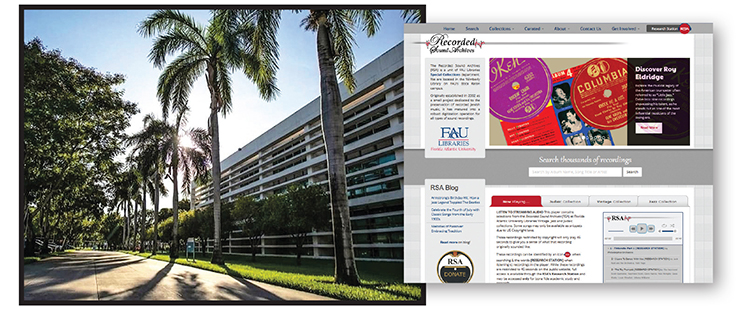Reference Open House 2025 | Three Libraries Around the Country Open Their Doors
From the research services of a presidential center to a large public library system and an academic music archive, explore three libraries around the country and the resources they rely upon.

 The three libraries highlighted here are typically used by residents, scholars, and enrolled students, but LJ’s reference open house invites everyone to explore their collections. The director of the Jimmy Carter Presidential Library and Museum, a community engagement librarian for the Kent District Library, and the staff at the Recorded Sound Archives at Florida Atlantic University’s Wimberly Library on the Boca Raton campus offer tours of their libraries’ resources, including, respectively, Rosalynn Carter’s office files, driving-test assistance, and a Judaica sound archive.
The three libraries highlighted here are typically used by residents, scholars, and enrolled students, but LJ’s reference open house invites everyone to explore their collections. The director of the Jimmy Carter Presidential Library and Museum, a community engagement librarian for the Kent District Library, and the staff at the Recorded Sound Archives at Florida Atlantic University’s Wimberly Library on the Boca Raton campus offer tours of their libraries’ resources, including, respectively, Rosalynn Carter’s office files, driving-test assistance, and a Judaica sound archive.
The Jimmy Carter Presidential Library and Museum | Atlanta, GA

The Jimmy Carter Presidential Library and Museum, located within a mile of downtown Atlanta, is nestled between two small lakes on 30 serene acres. One of 45 presidential libraries or sites in the United States, it opened to the public on October 1, 1986, which was the former president’s 62nd birthday.
The library, one of 15 administered by the U.S. National Archives and Records Administration (NARA), is home to research materials that document the history and legacy of the 39th president of the United States, his administration, former First Lady Rosalynn Carter, their family, and more. The museum’s immersive exhibitions offer a close-up view of the modern American presidency and relate to President Carter’s efforts to elevate and institutionalize human rights as a component of foreign policy decision-making.
The library offers primary resources to researchers of all types, from grade schoolers to journalists. On average, the library assists 500 researchers in person a year and twice as many by email, phone, and virtually. In-person visitors must make an appointment in advance. When they arrive, security will escort them to the research room, filled with materials they can review and handle. The museum part of the library exhibits fragile items.
Online researchers can access the library’s archival collections either by visiting the Jimmy Carter Presidential Library website (jimmycarterlibrary.gov/research/archives), which is updated biannually, or by using the National Archives Catalog (catalog.archives.gov), updated monthly. In both databases, the resources come in multiple formats: paper, photographs, audio, and film. There are approximately 20,000 views of these materials per month. The most commonly requested collections, in addition to the Jimmy Carter papers themselves, include the former first lady’s office files, the papers of Stuart Eizenstat (Carter’s chief domestic policy advisor), and the papers of Zbigniew Brzezinski (Carter’s national security advisor). Through these collections, researchers enter the Camp David talks, the Iran hostage negotiations, and other era-defining moments of the Carter administration.
The library grants access to the entire span of President Carter’s term and legacy, of course, but it also contains reference materials and information about his remarkable life way before and after his term ended. For example, the collections include the former president’s grade school report cards, records about his naval service, family photos, documents relating to campaign strategies, memorabilia, campaign ads (print and televised), speeches, correspondence, trip reports, and materials about foreign and domestic policy in the Carter administration.
Researchers with a Georgia-centric focus can visit the Digital Library of Georgia’s “A Gateway to Georgia’s History” database (dlg.usg.edu) and use President Carter’s name as a keyword search. Their search results will yield a few of the presidential library’s digital collections, comprised of resources about his early political career in the Georgia General Assembly (1963–67) and his term as governor of Georgia (1971–75), plus much more about the only elected president of the United States from Georgia.—Dr. Meredith R. Evans, Director of the Jimmy Carter Presidential Library and Museum.
Kent District Library | Comstock Park, MI

Kent District Library (KDL) is a 20-branch system with a mix of urban, suburban, and rural libraries and a bookmobile in Kent County, MI. Owing to KDL’s diverse patron base, the library system offers a wide range of resources for everyone’s information needs. The bookmobile in particular serves a wide audience. On a typical day, it goes to playgroups with babies, apartment complexes, senior living facilities, and community parks. If there is a festival or event in town, there is a good chance the bookmobile will be there, offering resources and spreading the word about library services.
KDL also supports entrepreneurial endeavors and other businesses. A smart starting place for such patrons is Data Axle Reference Solutions (data-axle.com/what-we-do/reference-solutions), which offers an extensive collection of corporate and residential contract information without a huge price. It provides a starting point for entrepreneurs and businesses looking for deeper insight into a range of markets. This is particularly helpful when researching which parts of town have businesses of a certain type, such as restaurants; whether there is a part of town that hasn’t been saturated yet; and where people can find their niche area for a business. Credit scores, general demographics, sales volume, and management information can all be found via this resource as well. For those interested in the consumer side of market research, Data Axle offers a U.S. Consumers and Lifestyle database. Patrons can look up information on questions such as how many pet owners are in a zip code in a particular city. For job seekers looking to get into a field, Data Axle is also of use. Its U.S. Jobs/Internships database can help patrons find jobs within a field, whether they’re trying something new or looking to advance in their field of choice.
LinkedIn Learning (linkedin.com/learning) is great for lifelong learners. It offers on-demand courses on everything from Microsoft products to public speaking. All courses are up to date and led by industry leaders. LinkedIn Learning is also useful for businesses aiming to update employees’ skill sets. A variety of certifications are available, including for Adobe, Zendesk, Atlassian, and Cisco systems. These are also of great use for job seekers looking for certifications to help them advance in a competitive market. Training on coding is a particular strength of the resource, covering popular programming languages including Python, SQL, and Java. The service is also quick to respond with new courses when topics are trending. One example is artificial intelligence; LinkedIn Learning offers courses in AI for business, responsible AI, and generative AI.
The ability to practice for driving tests is essential to patrons looking for success with the exam. KDL provides Driving Tests (driving-tests.org) a resource that offers up-to-date driving tests for standard car operators, CDL license seekers, and motorcycle drivers. The practice tests address everything that will be on each exam. This is especially helpful for CDL license seekers who need to learn specific skills including Hazmat, air brakes, and pre-trip inspections. Each state’s DMV or secretary of state’s handbook is also available via PDF, or MP3 for audio learners. Patrons can practice in the comfort of their own homes or the library.—Hannah Lewis, a Community Engagement Librarian for the Kent Library District.
The Recorded Sound Archives at FAU University Libraries, Florida Atlantic University | Boca Raton, FL

The Recorded Sound Archives (RSA) at Florida Atlantic University’s (FAU) Wimberly Library on the Boca Raton campus is a remarkable repository of auditory history. Established in 2002 to preserve Jewish music, it has grown into a comprehensive initiative dedicated to digitizing and protecting a diverse range of sound recordings.
The project originated with a volunteer, Rabbi Ario Hyams, who assisted with organizing the Hebrew and Yiddish sheet music collections. Hyams meticulously collected and documented records and tapes by hand, laying the groundwork for what would later become the RSA. Following Hyams’s passing in 2002, Nathan “Nat” Tinanoff, a retired IBM employee who volunteered at FAU Special Collections, continued the project. With a deep passion for preserving the initial collection of over 500 cantorial and Yiddish records, Tinanoff became the director of the Jewish Music Rescue Project, later renamed the Judaica Sound Archives. His outreach to organizations such as the National Yiddish Book Center, plus the leadership of a dedicated group of volunteers, significantly expanded the collection. In 2009, RSA experienced two major milestones with significant acquisitions. The first was a donation of jazz recordings from FAU’s College of Arts and Letters’ Music Department. The second significant acquisition was a comprehensive collection of early American vintage recordings from the estate of Jack Saul, a major collector of music recordings, based in Cleveland. The Cleveland-based collection was so large that its removal caused the foundation of Saul’s home to shift. These additions marked a pivotal expansion, establishing the RSA as a broad repository of sound recordings.
Today, the RSA houses over 150,000 recordings, each representing a unique cultural and historical heritage. The collection includes rare jazz sessions and early American tunes, underscoring the importance of preserving sound recordings. Contributions from individuals and organizations ensure that these audio artifacts remain accessible for future generations. A core component of the archive’s mission is its robust digitization effort, converting analog recordings into digital formats and making them accessible on the RSA website (rsa.fau.edu)). This allows a global audience to appreciate and study these recordings. The RSA serves as a vital resource for students, educators, researchers, and music enthusiasts. It supports 800 researchers worldwide, fostering deeper insights into audio heritage and cultural preservation. Its music player (rsa.fau.edu) streams recordings globally through the RSA Research Station, giving researchers access to materials without financial barriers.
Among the most prized collections is the Cantorial Voices Collection, (rsa.fau.edu/role/cantor) which features over 300 historical cantorial voices. Complementing this is the Sounds ’n Scores Project (rsa.fau.edu/sm), which provides a distinctive online experience by pairing cantorial music with its corresponding sheet music. This valuable resource aids scholars, cantorial students, and synagogues in connecting and preserving the rich historical cantorial repertoire.
While the RSA primarily focuses on the preservation and digitization of unique sound recordings, it also utilizes subscription databases such as Oxford Music Online (oxfordmusiconline.com) and Alexander Street Music Online (alexanderstreet.com/discipline/music-dance) to support its research efforts. These databases include access to scholarly articles, biographies, and other essential resources, enabling researchers to deepen their understanding of the cultural and historical context of its collections.
Additionally, RSA engages students through classes and exhibitions that explore how the collections relate to popular culture, such as horror films and video games that use these familiar sounds as primary resources.
The Recorded Sound Archives at FAU’s Wimberly Library underscore the vital role of preserving sound recordings as cultural artifacts. From its origins in preserving Jewish music to its status as a repository of diverse recordings, the RSA continues to inspire and educate through its commitment to accessibility and digital innovation.—Victoria Thur, a rare book librarian and Assistant Dean for Special Collections, Archives, and Distinctive Collections at FAU. Alethea Perez, manager of the Recorded Sound Archives at FAU Libraries.
RELATED
ALREADY A SUBSCRIBER? LOG IN
We are currently offering this content for free. Sign up now to activate your personal profile, where you can save articles for future viewing









Add Comment :-
Comment Policy:
Comment should not be empty !!!